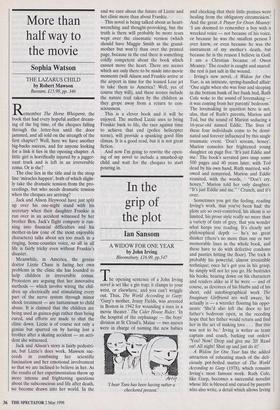More than half way to the movie
Sophia Watson
THE LAZARUS CHILD by Robert Mawson Bantam, £15.99, pp. 346 Remember The Horse Whisperer, the book that had every hopeful author dream- ing of the big time, of the cheques falling through the letter-box until the door jammed, and all sold on the strength of the first chapter? Well, here we have another big-bucks success, and for anyone looking for a link it lies in the opening chapter. A little girl is horrifically injured by a jugger- naut truck and is left in an irreversible coma. Or is she?
The clue lies in the title and in the strap line 'miracles happen', both of which slight- ly take the dramatic tension from the pro- ceedings, but who needs dramatic tension when the cheques are arriving?
Jack and Alison Heywood have just split up over his one-night stand with his secretary when their daughter Frankie is run over in an accident witnessed by her brother Ben. Jack's flight company is run- ning into financial difficulties and his mother-in-law (one of the most enjoyable characters) talks about sex too much in a ringing, home-counties voice, so all in all life is fairly tricky even without Frankie's disaster.
Meanwhile, in America, the genius doctor Lizzie Chase is facing her own problems in the clinic she has founded to help children in irreversible comas. Protesters are arguing that her innovative methods — which involve wiring the chil- dren up electrically and stimulating every part of the nerve system through minor shock treatment — are tantamount to child abuse. It is claimed that the children are being used as guinea-pigs rather than being cured, and efforts are made to shut the clinic down. Lizzie is of course not only a genius but spurred on by having lost a brother after a skating accident — an acci- dent she witnessed.
Jack and Alison's story is fairly pedestri- an, but Lizzie's does work. Mawson suc- ceeds in combining her scientific fascination and her emotional involvement so that we are inclined to believe in her. As the results of her experimentation throw up more intense and frightening questions about the subconscious and life after death, we become drawn into her world. In the end we care about the future of Lizzie and her clinic more than about Frankie.
This novel is being talked about as heart- wrenching and thought-provoking, but the truth is there will probably be more tears wept over the cinematic version (which should have Maggie Smith as the grand- mother but won't) than over the printed page, because in the end there is something coldly competent about the book which cannot move the heart. There are scenes which are only there to be made into movie moments (will Alison and Frankie arrive at the airport in time for the loaned Lear jet to take them to America? Well, yes of course they will), and these scenes include the nature trail taken by the children as they grope away from a return to con- sciousness.
This is a clever book and it will be enjoyed. The method Lizzie uses to bring Frankie back to life, the race against time to achieve that end (police helicopter scene), will provide a spanking good film climax. It is a good read, but it is not great fiction.
And now I'm going to rewrite the open- ing of my novel to include a smashed-up child and wait for the cheques to start pouring in.


























































 Previous page
Previous page